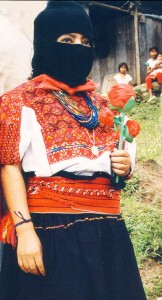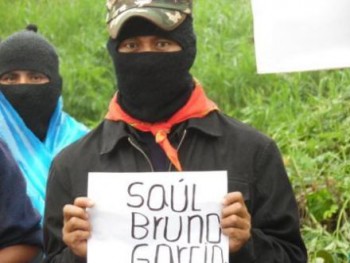

Colectivo Radio Zapatista. México, 6 de enero de 2016.

MUJER DE AIRE
Para Ramona, comandanta, a diez años de su partida.
Llorábamos colibríes que nos nacían pecho dentro. Pequeños y caídos de los ojos, nos aleteaban incorporados con fuerza, gotas de almas guerreras que nunca se marchaban sin libarnos el corazón.
Cantábamos cenzontles agolpados en las muelas que nos rozaban la faringe desde el silencio de nuestra voz.
Transpirábamos quetzales engendrados en las venas. Y nos escurría el honor y nos empapaba aquella majestuosa bruma de nuestra ancestría.
Pero vivíamos tiempos peores, los de la invisibilidad, cuando nos cubríamos ante la luna para no mirar. Cuando éramos olvido, mentira, duda.
Luego llegaron las mujeres y los hombres de maíz obligando a la verdad a caminar erguida. La trajeron caminando sus caminos. Nos escarbaron las arterias, las bocas, nos arañaron las miradas para despojarnos del temor y enseñarnos a destruir nuestra violencia fraternal.
Venía en esos caminos una indígena tzotzil que siendo nadie se volvió todas y todos. Guiada y seguida por nuestra historia, se reunió con valientes para ser en colectivo y aleccionarnos. Cuando los desiertos la ahogaban, sobrevoló jardines coral y su llanto mojó cementerios que devolvían en azul nuestro reflejo. Por ella y todos ellos adquirimos la técnica suave que desaparece costras en anís. Y tejimos colores desenredando cabelleras torcidas por sangre como quien rasga un harpa cordada al cristal.
Entre sus dedos, ella hilvanó hermanas y hermanos para enderezar, ligeros, nuestros huesos en huida hacia lo nuevo. Entonces nos descubrimos bajo el sol y la escuchamos decir lo que nunca dijo:
“Yo soy mujer de aire
que alentó nubes oscuras
y bailó a compás de trueno,
mujer bronceada por relámpagos.
Amamanté legiones de criaturas tristes
para endulzar sus bocas excoriaditas de sal.
Si la atmósfera suelda nuestra frontera inmediata,
¿cómo podrá aprisionarme el dolor? Yo respiro viento.
Cuando lleguen los tiempos mejores donde el alba
escape de su cárcel de montaña y el sol decida
quemar el horizonte como insinuando su perfil
en lontananza, volveré a ocupar este cuerpo
sin años que, en reposo total, sugerirá
paciencia a las constelaciones
mientras anticipa, agorero,
la nostalgia”.

A las Bases de Apoyo Zapatistas
A las comunidades indígenas zapatistas
A las Juntas de Buen Gobierno
Al Ejército Zapatista de Liberación Nacional
Compañeras y compañeros zapatistas:
Les saludamos y escribimos desde la Red contra la Represión y la Solidaridad, las razones y sentimientos que provocan estas líneas son varios y diversos. Como diversa es la lucha por la libertad, la democracia y la justicia, mucha de esa abundancia de resistencias y rebeldías han encontrado su punto de partida en el quehacer político animado desde el Sureste mexicano.
Hace poco más de dos décadas una parte de la izquierda en el país y en el mundo se encontraba en el desconsuelo y la derrota, las coartadas para justificar traiciones, abandonando principios éticos y abonando la política de lo posible con el supuesto triunfo del pensamiento único.
Cuando se decretaba el fin de la historia y en ese contexto el pensar críticamente era sustituido por un pragmatismo indolente ante a una realidad desgarradora. Ustedes, insurgentas e insurgentes zapatistas, irrumpían en el manipulado tablero del poder financiero, bancario y político, con una bota enlodada a su paso al bajar de las montañas; sitiando así al sistema de partido único de Estado.
Compas zapatistas, fue con su fuego y su palabra, lo que marcó el inicio de una nueva época en las luchas libertarias y emancipadoras de la humanidad. Nada de lo que existe actualmente hubiera sido posible sin el levantamiento armado del primero de enero de 1994. Lo decimos claramente, cuando la oscuridad imperaba en el mundo, su luz se coló por una grieta del muro de la noche y amaneció con la insurrecta esperanza.
Photos: Rádio da Juventude (Brazil) and Free Media Chiapas
Listen to or download the audio:
[podcast]https://radiozapatista.org/wp-content/uploads/2016/01/20160101_EZLN-audio-comunicado.mp3[/podcast]
January 1, 2016
GOOD EVENING, GOOD DAY COMPAÑERO AND COMPAÑERA BASES OF SUPPORT FROM THE ZAPATISTA ARMY FOR NATIONAL LIBERATION, COMPAÑERO/AS MILICIANOS AND MILICIANAS,[i] INSURGENTS, LOCAL AND REGIONAL RESPONSABLES,[ii] AUTHORITIES FROM THE THREE LEVELS OF AUTONOMOUS GOVERNMENT, COMPAÑERO/AS PROMOTORES AND PROMOTORAS[iii] OF THE DIFFERENT WORK AREAS, COMPAÑEROS AND COMPAÑERAS OF THE NATIONAL AND INTERNATIONAL SIXTH, AND ALL WHO ARE PRESENT.
Compañeras and compañeros, today we are here to celebrate the 22nd anniversary of the beginning of the war against oblivion.
For more than 500 years we have endured the war that the powerful from different nations, languages, colors, and beliefs have made against us in order to annihilate us.
They wanted to kill us, be it through killing our bodies or killing our ideas.
But we resist.
As original peoples, as guardians of mother earth, we resist.
Not only here and not only our color, which is the color of the earth.
In all of the corners of the earth that suffered in the past and still suffer now, there were and there are dignified and rebellious people who resisted, who resist against the death imposed from above.
January 1, 1994, 22 years ago, we made public the “ENOUGH!” that we had prepared in dignified silence for a decade.
In silencing our pain we were preparing its scream.
Our word, at that time, came from fire.
In order to wake those who slept.
To raise the fallen.
To incense those who conformed and surrendered.
To rebel against history
To force it to tell that which it had silenced.
To reveal the history of exploitations, murders, dispossessions, disrespect and forgetting that it was hiding behind the history of above.

Al EZLN
A las Juntas de Buen Gobierno
A las bases de apoyo zapatistas
A la Sexta
Al CNI
A quienes resisten y construyen autonomía
Hace 32 años que la rebeldía empezó a caminar en las profundidades de la Selva Lacandona. No eran unos primeros pasos , si no la continuación de un caminar de 500 años. La resistencia indígena que tomó tantas formas y nombres desde que la noche de la colonización y la conquista cayera sobre los pueblos originarios, tomaba ahora el de aquella persona que gritó frente a los hacendados y terratenientes aquel sonoro !Tierra y Libertad!. Nacía hace 32 años el Ejército Zapatista de Liberación Nacional.
Y celebrar su 32 aniversario es celebrar muchas cosas. Es alegrarse de que la llama de la rebeldía encontrase en las y los indígenas chiapanecos quien la alimentase y la hiciese crecer. El zapatismo se empapa del pensamiento tan único y digno de los pueblos mayas y crea formas de lucha y expresión que inspiraron y siguen inspirando a quienes pensaron que el siglo que empezaba estaría plagado de derrotas. Celebrar al EZLN es celebrar la esperanza que germinó en la oscuridad de la montaña y apareció con rostro encapuchado aquel amanecer de 1994. Es celebrar el no rendirse, el no venderse, el no desistir, el saber reconstruirse y no encallar contra los muros del inmobilismo y el dogma.
CGT celebra el aniversario del EZLN. 32 años sembrando autonomía.

El 17 Noviembre de 1983 es una fecha entrañable que convoca a la memoria, a la historia y a la rebeldía. Son ya muchas las lunas que han testimoniado el empecinamiento de mujeres y hombres a lo largo de este extenso lugar en el tiempo y de este prolongado andar en tantos espacios.
Gracias compañeras y compañeros del Ejército Zapatista de Liberación Nacional por compartirnos generosamente un presente de lucha diferente. Un presente siempre es un regalo, en este caso, el de provocarnos el coraje de retomar la capacidad de decidir el qué, el cómo y el con quiénes queremos construir nuestras vidas y mundos en colectivo.
De su experiencia organizativa seguimos aprendiendo. Desde sus inicios ustedes han demostrado que se puede conjugar la teoría y la práctica de manera consecuente, con la imprescindible compañía de la ética y lo imposible, para así intentar llegar a la transformación cabal de las distintas realidades que padecemos y vivimos.
Nunca con mentiras, jamás con engaños, sino, por el contrario, con la claridad de sus pensamientos y de sus acciones, han andado, nos han acompañado. Son actualmente uno de los referentes globales más importantes contra del sistema capitalista y uno de los movimientos políticos cuya organización apunta a la construcción de otro mundo y otra vida ajena a la guerra, la destrucción y la muerte. Compañeras y compañeros zapatistas ustedes son para millones de personas en el mundo un ejemplo, una inspiración, una historia viva que de día y de noche sigue adelante.

Fuente: La Jornada
20 de Octubre de 2015
Luis Hernández Navarro
El libro póstumo de Luis Villoro, La alternativa: perspectivas y posibilidades de cambio, es un acontecimiento intelectual. Su pensamiento trastoca radicalmente el orden y el lenguaje dominantes. Cuartea las certezas preponderantes, elabora un nuevo idioma para la resistencia y ofrece un horizonte diferente de la transformación social.
En una época marcada por lo que la llamada Dama de Hierro, Margaret Thatcher, primera ministra británica entre 1979 y 1990, caracterizó como la del reinado del TINA (There is not alternative), es decir, en una era en que no había más discurso posible que el del neoliberalismo y se carecía de opciones para enfrentarlo, Luis Villoro escribió este libro, reivindicando la posibilidad del cambio.
Chiapas, México, 28 de septiembre. “Sigue y seguirá la lucha por los desaparecidos de Ayotzinapa. Padres y familiares de los desaparecidos, su dolor y rabia es nuestra”, se leyó el pasado 26 de septiembre en los diferentes territorios zapatistas de la geografía chiapaneca. “Vivos se los llevaron, vivos los queremos”, exigieron las Bases de Apoyo del Ejército Zapatista de Liberación Nacional (BAEZLN), en el sureste de México, a un año de la desaparición forzada de los estudiantes de la normal de Ayotzinapa, en Iguala Guerrero.
En el caso del Caracol zapatista de Oventik, de los Altos de Chiapas, se observaban diferentes mantas de apoyo, de cada municipio autónomo que se dio cita: “la lucha por los desaparecidos de Ayotzinapa seguirá”, afirmaban. También se podían apreciar veladoras para para cada uno de los normalistas agredidos. “Con resistencia y rebeldía exigimos justicia”, externaban en diferentes pancartas las y los rebeldes chiapanecos bajo una llovizna incesante.

“Sabe nuestro colectivo corazón, de antes y de ahora, que nuestro dolor no es lamento estéril”
“Sabe que nuestra rabia no es desahogo inútil.”
“Sabemos quienes somos lo que somos, que nuestros dolores y rabias nacen y se alimentan de mentiras e injusticias.”

Oventic, Chiapas, 26 de septiembre de 2015. Miles de Bases de Apoyo del Ejército Zapatista de Liberación Nacional (BAEZLN), se manifestaron desde temprana hora en sus diferentes territorios en la geografía chiapaneca, en solidaridad con familiares y compañeros de los 43 normalistas desaparecidos de la normal rural de Ayotzinapa en Iguala, Guerrero.
Como lo habían anunciado desde el pasado 24 de septiembre, niños, mujeres, hombres y ancianos de la zona Altos se manifestaron a lo largo de la carretera frente al caracol de Oventic “Corazón céntrico de los zapatistas delante del mundo”, con mantas, carteles, veladoras, portando los nombres de cada uno de los 43 ausentes de la normal de Ayotzinapa.
Alrededor del medio día las BAEZLN ingresaron al caracol para realizar un acto en memoria de “Ayotzinapa y todos los Ayotzinapas que hieren los calendarios y geografías de abajo”.
Bajo una llovizna constante la manifestación se realizó en el contexto de las movilizaciones a nivel nacional e internacional para exigir como desde hace un año la presentación con vida de los normalistas rurales.
Radio Pozol y Regeneración Radio.